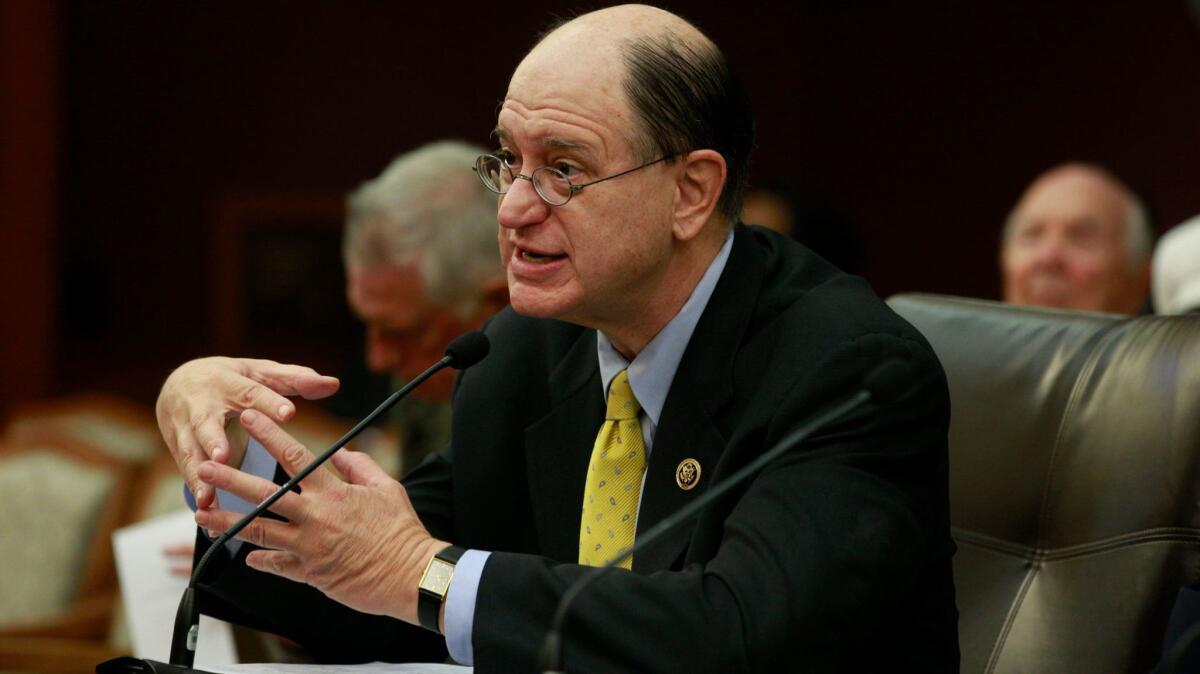Sherman reintroduces bill to let Wells Fargo customers sue over unwanted accounts

- Share via
Wells Fargo & Co. has pledged to reimburse customers harmed when its employees opened unauthorized accounts in their name — but it has been unwilling to allow lawsuits for damages, which are barred by the bank’s standard arbitration clause.
On Tuesday, Rep. Brad Sherman (D-Sherman Oaks) reintroduced a bill he wrote last year that would allow customers to have their cases heard in court.
Arbitration is a private venue that supporters say is quicker and cheaper than the public court system, but critics say it is stacked in corporations’ favor and allows them to keep disputes under wraps.
Wells Fargo’s arbitration practices, detailed by The Times in 2015, have been in the spotlight since the San Francisco bank agreed to pay $185 million in fines last year after employees were found to have created as many as 2 million checking, savings and other accounts without authorization.
The accounts often came with fees and other charges the bank has agreed to refund, but some customers have sought to sue the bank — only to be rebuffed by the courts.
Bank attorneys have successfully argued that when customers opened legitimate accounts, they signed contracts agreeing to settle all disputes in arbitration. Courts have agreed that because those contracts apply to “all disputes,” customers must go to arbitration to settle claims even over unauthorized accounts.
Sherman’s bill, and a matching Senate version sponsored by Sen. Sherrod Brown (D-Ohio), called the Justice for Victims of Fraud Act, would amend two federal banking laws to say that arbitration clauses are not enforceable in relation to accounts created without customers’ authorization. It would apply to all banks, not just Wells Fargo.
“If customers never authorized the opening of a phony credit card or checking account, there is no reason they should be bound by the arbitration agreement they were forced to sign when they set up a legitimate account,” Sherman said in a statement.
Sherman’s bill was reintroduced Tuesday along with a host of other proposals by Democratic members of the House and Senate that seek to rein in arbitration clauses. Some of the bills are broad, while others target specific types of contracts, such as those signed by students enrolling in for-profit colleges.
Aaron Brodie, a 911 dispatcher in Texas, said that an unauthorized credit card account opened for him by a former Wells Fargo employee led him into debt and harmed his credit score, resulting in years of higher interest rates and other costs.
He said he has since tried to join in a class-action suit against the bank, but that Wells Fargo is trying to push him and other plaintiffs into arbitration.
“The only way we’ll be able to achieve justice is through the courts,” said Brodie, who spoke at a Washington news conference in support of the bills, which face an uphill battle to become law because the GOP controls both houses of Congress.
Wells Fargo spokeswoman Jennifer Dunn said the bank is trying to work directly with customers to address problems with unauthorized or unwanted accounts.
If customers are not satisfied with the bank’s response, they can go to an outside mediator hired by the bank. If they’re still not happy, they can go to arbitration, she said.
“We believe that these steps are in the best interest of our customers and provide numerous opportunities for them to be made whole,” Dunn said.
Follow me: @jrkoren
More to Read
Inside the business of entertainment
The Wide Shot brings you news, analysis and insights on everything from streaming wars to production — and what it all means for the future.
You may occasionally receive promotional content from the Los Angeles Times.











